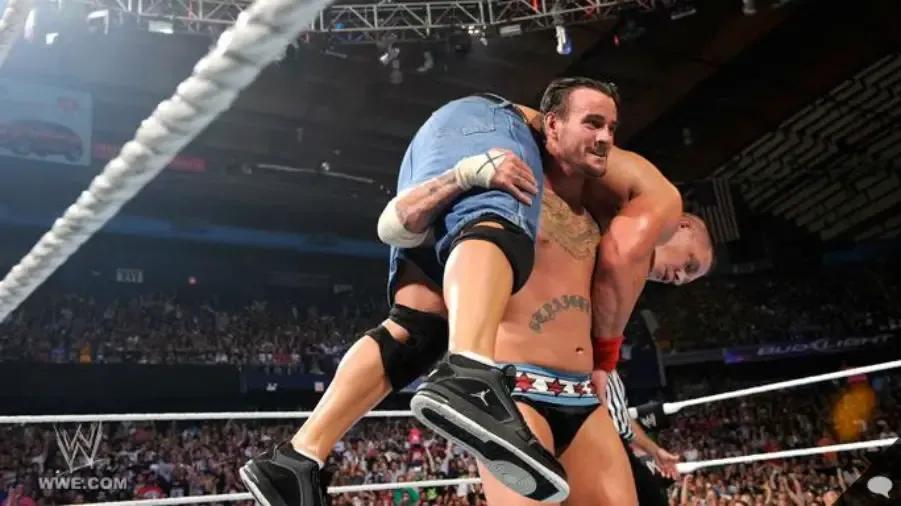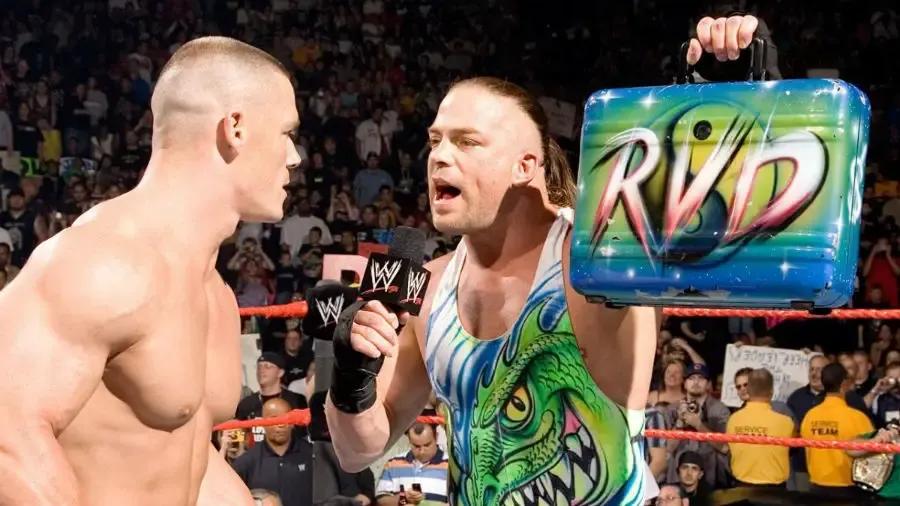8 Reasons WWE Money In The Bank Deserves To Be A 'Big 5' PPV
MITB should be held in the same regard as shows like the Rumble and Survivor Series...

Nov 23, 2017
WWE's potential 2018 PPV schedule recently surfaced online, the biggest talking point being Money In The Bank.
The pay per view is set to return to Chicago - site of CM Punk's infamous triumph over John Cena in 2011 - and will be the only co-branded PPV alongside the traditional 'Big 4'. Has Money In The Bank finally been given a leap in prominence, pushing it to the same level as WrestleMania, the Royal Rumble, Survivor Series, and SummerSlam?
If this is indeed the start of a new 'Big 5' era, it must be considered an exciting development. No other 'B' or 'second-tier' pay per view deserves it more, for reasons we'll explore in just a second.
Over the past few years, noise has been made online regarding a potential reshuffle, with MITB replacing Survivor Series in the 'Big 4' - but I personally find this arrangement far more appealing. WWE's November spectacular is 30-years-old, and despite claims that it's become outdated, has actually been one of the most consistently compelling shows of WWE's calendar in recent years.
With that said, I still agree that Money In The Bank deserves a boost in terms of significance. Since its inception in 2010, it has become one of the more highly-anticipated pay per views of the year. I'm sure I'm not alone in suggesting that it fully deserves to be considered on the same level as its older cousins.
The reasons are various, so let's get straight to them.
The most important part of a Money In The Bank PPV is, of course, the eponymous stipulation. Many shows these days do have a key theme or match type, but I think Money In The Bank and the Royal Rumble are unique in this regard.
Rarely elsewhere do we see a stipulation have such importance in terms of long-term storytelling over the course of the year. As we all know, the Rumble winner goes on to earn a title shot at WrestleMania - but the Money In The Bank briefcase could be seen as having an even more powerful role.
The Rumble is more of a ceremonial victory, theoretically granting the winner the main event of WrestleMania (or, more commonly in recent times,
a
main event). The rules governing the briefcase are far more advantageous to the holder - and also give writers far more flexibility. It also gives WWE the powers of shock and anticipation, and could even be seen as the most crucial stipulation of the year in the grand scheme of things.
When viewed like this, it's actually quite shocking that Money In The Bank has remained a second-tier PPV for so long - especially as it graduated from a feature of 'Mania to its own event in just five years.

Although we do see exciting action on regular monthly pay per views - Shane McMahon's dive at Hell In A Cell the most obvious recent example - the traditional 'Big 4' can often be relied upon to deliver thrills with greater consistency.
The very nature of Money In The Bank's signature match makes such action inevitable. Many wrestlers - including, most famously, CM Punk - have spoken about the anarchic nature of such bouts, and how dangerous it is to execute in a truly safe manner.
That's completely understandable, but it doesn't stop us selfish wrestling fans from clamouring over the carnage. No other lower-tier PPV can guarantee such action as much as MITB - even Hell In A Cell, which often lets fans down due to the toned-down nature of its stipulation. (Only sometimes, of course. Sorry Shane.)

Whenever Money In The Bank rolls around, you can be certain that people will start to talk about the 2011 incarnation.
That show was one of the best WWE pay per views of the modern era - perhaps even one of the best PPVs ever. We've already talked about Punk's transcendent triumph in the main event, but the show also featured two immensely exciting MITB ladder matches, and a very intelligently-worked contest between Randy Orton and Christian.
As well as being a memorably brilliant show, Money In The Bank 2011 helped grant the pay per view a sense of continued mystique. Could this be the year we see a show of similar quality? Will we see another groundbreaking title change?
Because MITB is already infused with this sense of expectation, it's naturally held in a higher regard than its fellow B-pay per views. A leap to 'Big 5' status only makes sense.

If this year's Money In The Bank show proved anything, it's that holding the event as a single-branded pay per view doesn't really work too well. Moving the even to co-branded 'Big 5' status would solve this problem.
2011 proved that having both a Raw and SmackDown ladder match isn't overkill - especially if they're each booked slightly differently to provide a little substance along with the chaos.
(Of course, 2017
did
have two ladder matches, but WWE seem keen for us to forget the inaugural women's bout due to James Ellsworth pulling the briefcase down).
This then allows WWE to pull the trigger on one cash-in fairly quickly, without completely sacrificing the anticipation of the stipulation until next year.

Now that the women's Money In The Bank ladder match is established, WWE could go back to having one briefcase shared across both Raw and SmackDown - making the co-branded nature of the pay per view even more exciting, while keeping two ladder matches on the card.
The strength of sharing one briefcase across two brands is unpredictability. This year, when Baron Corbin and Carmella won their respective matches, we could be pretty sure that they'd be cashing-in on the champion of their own brand (although at the time of writing, the women's briefcase hasn't yet been cashed-in).
Conversely, keeping the terms of the briefcase vague can lead to all sorts of Edge-like opportunistic shenanigans - and that can only be a good thing.

A key factor of each of the current 'Big 4' pay per views is history. The youngest is SummerSlam (if we ignore the fact that the inaugural Rumble wasn't technically a pay per view), and even that was first established as long ago as 1988.
Money In The Bank would be quite a jarring addition to the major PPV tier, given that its first show was only seven years ago. On the other hand, for such a young pay per view, it cannot be argued that MITB doesn't have a boatload of history.
As mentioned, Money In The Bank's 2011 edition gave us one of the best pay per views of the modern era - and even the fact that the stipulation is older than the show itself lends a great sense of history and reverence.
Just as WWE loves to churn out old Royal Rumble statistics in January, the history of the MITB ladder match could be more fully emphasised around June - from the early victories of Edge and RVD to the biggest cash-in of all, Seth Rollins at WrestleMania 31.

A lot of criticism is aimed at modern, stipulation-themed pay per views - and perhaps rightly so. Shows such as Hell In A Cell and Extreme Rules take key storytelling devices - matches that should be reserved for feuds that correspond with them in intensity - and force them to occur at a fixed time of year.
This can often lead to matches that feel like an unworthy continuation of a beloved old theme - such as Hell In A Cell bouts that don't live up to the intensity of Undertaker vs. Michaels or Triple H vs. Foley.
Money In The Bank avoids this issue because of its relative youth, but also because the event itself has a certain charm and character. Much like the Royal Rumble, we look forward to MITB because it's an unusual night. We know that outcomes can happen - or could
potentially
happen - thereby lending the PPV a sense of off-kilter excitement.

Let's close on the most straightforward reason: it'll be fun!
The 'Big 4' are unquestionable highlights of the wrestling calendar, shows many of us make sure to check out regardless of the card.
While I'm not suggesting that WWE should elevate several more pay per views to this level, I don't see the harm in boosting one more. Money In The Bank would be a modern, energetic addition to the existing top-tier shows - and who could begrudge the idea of an extra big night of wrestling?
At the dawn of the Women's Revolution, Lynch seemed to take a backseat to contemporaries like Charlotte Flair, Sasha Banks, Paige, and others. The 2016 brand split allowed for Lynch to get a little bit of breathing room on SmackDown, which paid immediate dividends.
More than a year into her main roster run, Lynch finally captured WWE gold by becoming the first-ever SmackDown Women's champion by winning a six-pack challenge at that year's Backlash. In all, she reigned with the belt for just under three months.
Despite her obvious popularity, WWE didn't seem content to roll with Lynch as much more than the number two or three babyface on the women's side of the roster. In fact, WWE attempted a heel turn for Lynch at SummerSlam 2018, rooted in bitterness toward Charlotte Flair.
Instead of booing her, fans openly sided with Lynch, who used the turn to unleash a new side of herself. No longer smiling beneath steampunk smokestacks, Lynch became a "Made Man" through cutting social media retorts, and a biting new attitude that turned many heads.
Finlay probably never received a bigger roar than the one he earned for gesturing toward the ring, as if to say to a ready and willing Lynch, "Have at it". Call it "Irish bias" if you must, but maybe, just maybe, the double-tough Finlay had finally met his match?
From there, Lynch winning the 2019 Rumble match (as a substitute for the injured Lana) was a mere formality - the vast crowd in Phoenix, even the cynics, could connect the dots. With rumours that the women's title match would headline Mania, Lynch had to be there.
While some felt the match pitting Lynch against Flair and Ronda Rousey for both Women's singles titles didn't quite achieve technical greatness (and/or that it was muddied by not being Lynch vs. Rousey one on one), the moment was still a landmark one.
Lynch scored a bit of a wonky pin on Rousey to not only send her arch-nemesis packing, but to win both belts in the WrestleMania finale. A moment once reserved for the Hogans and the Savages and the Austins and the Cenas added Becky Lynch to its lifetime collection.
With that monumental WrestleMania win came a monster reign. From that night through the Monday after the 2020 Money in the Bank, Lynch held onto the Raw Women's title, going over on everyone from Lacey Evans to Sasha Banks, from Asuka to Shayna Baszler.
As the biggest star in the entire Women's scene, Lynch was afforded the opportunity to clean out the division. Had it not been for this bout of maternity leave, who's to say how much longer her record-setting reign as champion would have gone?